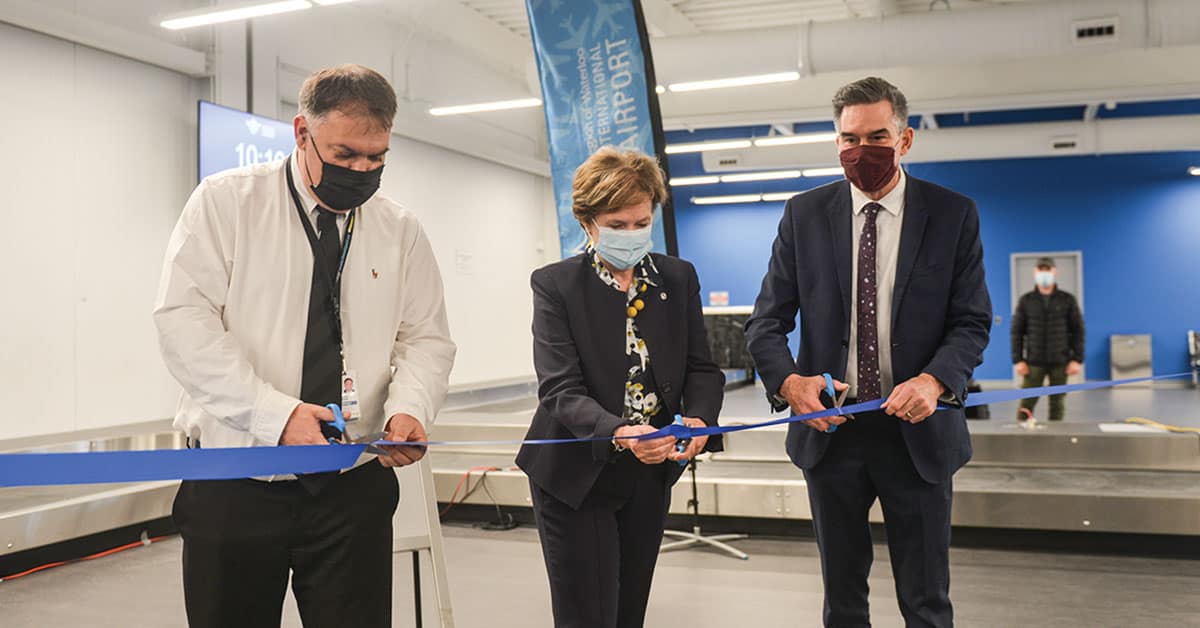In the morning Waterloo Region Chair Karen Redman deemed it a “great day for the airport and our region,” in the afternoon the CEO of Flair, the very airline that is expected to lead service out of the newly expanded airport, had to reassure customers that it would be able to continue flying past May 3.
The region last week held the official opening of the domestic arrivals building, part of the $44- million terminal expansion at Waterloo Region International Airport in Breslau.
“Airports play a vital role in the prosperity of communities by connecting people and businesses with the world. …The work being done here is critical to the future of our region, our economy and the way we travel,” said Kitchener-Conestoga MP Tim Louis at the event to mark the opening.
“An expanded domestic air terminal will help the airport to comfortably and reliably accommodate the increasing number of travelers arriving to and departing from the Region of Waterloo,” he said.
The number of passengers coming through YKF is expected to increase to more than 700,000 in 2022, up from just 171,828 in 2021.
The new building will be able to handle the three 737s (two domestic, one international) at a time. The expansion is part of the $375 million master plan for the airport that was passed by regional council in 2017.
“Not only does this expansion increase convenience for passengers, enabling families and businesses to connect with more freedom, to our economic hubs, but it also directly supports our growing aerospace and aviation sector,” said Redman.
Part of the region’s reasoning for YKF’s expansion is the increasing number of passengers at Toronto’s Pearson airport, which is expected to reach 85 million passengers a year by 2037. While Pearson does have its own plan for expansion, Redman does not see it impacting the local airport.
“Even if Pearson expands, they have an eye on international travel. We have domestic flights as well as some international flights, but what we don’t have is the bumper-to-bumper traffic on the 401. We don’t have expensive parking. We don’t have some of the chaos that ensues with a huge airport. There are a lot of reasons to recognize that this investment is a smart thing to do for the region,” she said.
As part of the overall expansion YKF is heavily reliant on flights provided by Flair Airlines, which began its service from the airport in Feb 2021. However the airline is currently under review by the Canadian Transportation Agency (CTA) about whether it meets the definition of being “Canadian” under the 1996 Canada Transportation Act.
The CTA gave Flair 60 days to respond to the preliminary determination that was released on March 3.
Speaking to the reporters on April 21, Flair CEO Stephen Jones said the airline is “is here to stay.”
“The May 3 deadline… is not a drop-dead day. May 3 is simply the date by which Flair needs to respond to CTA on the concerns that they’ve raised in their preliminary hearings. There is zero chance that Flair will lose its license on May 3,” Jones said.
According to the CTA there are three requirements that must be met for an air carrier to be considered Canadian: incorporation, the voting interest (a non-Canadian cannot own more than 50 per cent of the voting interest) and Canadian control in fact.
According to Jones his company meets all these requirements. Flair is incorporated in BC, while 58 per cent of the shares are owned by Canadians, with no non-Canadian owner holding more than 25 per cent.
The third requirement is more subjective, Jones said.
“There’s no hard line test for control in fact. It’s important to note here that the CTA does not need to find that control was being exhibited by non-Canadians, rather simply tests where control can be by looking at the entire set of relationships it has with non-Canadians. The CTA accepts that non Canadians are entitled to take steps to protect the value of their investment,” he said.
The preliminary determination was prompted by questions about the amount of influcence Miami-based investment firm 777 Partners has over Flair.
The airline turned to the firm for funding during the pandemic, Jones said.
“This was required by Flair during COVID to ensure the survival of the airline and in protection of jobs and connectivity for all Canadians. As we stand here today, Flair is strongly cash self-generating and is projecting significant cash surpluses to build over the summer period. We are no longer dependent on 777 partners on day-to-day cash needs; 777 partners never used the fact that they were providing us cash to exert day-to-day control,” he said.
While Jones declined to say how much Flair owes to 777, they have refinanced nearly $80 million of it. They have also removed a number of legal rights that 777 had and reduced the number of directors the firm can appoint to two.
Addressing Flair’s involvement with YKF, Jones said the issues were “absolutely not known” before the expansion.
“We’ve got 150 people directly employed in our business in the Kitchener Waterloo Region. I think it’s a very wise investment and we look forward to continuing to grow our business there,” he said.
Chris Wood, general Manager of YKF, said they have been following the situation closely.
“We have talked to Flair and we’re supportive of them, and we believe they will get their house in order and get through this,” Wood said in an interview
“I think what has also happened is Flair has proven that there’s a market here for other airlines to potentially come in, and fly some of those routes.”









